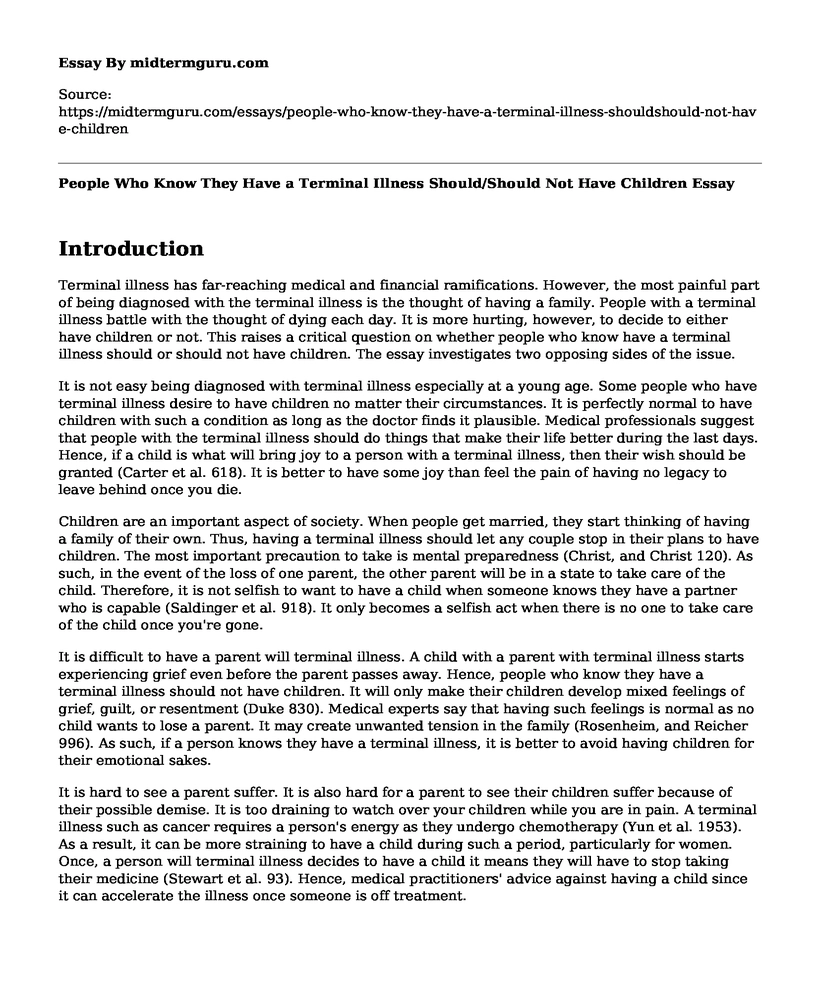Introduction
Terminal illness has far-reaching medical and financial ramifications. However, the most painful part of being diagnosed with the terminal illness is the thought of having a family. People with a terminal illness battle with the thought of dying each day. It is more hurting, however, to decide to either have children or not. This raises a critical question on whether people who know have a terminal illness should or should not have children. The essay investigates two opposing sides of the issue.
It is not easy being diagnosed with terminal illness especially at a young age. Some people who have terminal illness desire to have children no matter their circumstances. It is perfectly normal to have children with such a condition as long as the doctor finds it plausible. Medical professionals suggest that people with the terminal illness should do things that make their life better during the last days. Hence, if a child is what will bring joy to a person with a terminal illness, then their wish should be granted (Carter et al. 618). It is better to have some joy than feel the pain of having no legacy to leave behind once you die.
Children are an important aspect of society. When people get married, they start thinking of having a family of their own. Thus, having a terminal illness should let any couple stop in their plans to have children. The most important precaution to take is mental preparedness (Christ, and Christ 120). As such, in the event of the loss of one parent, the other parent will be in a state to take care of the child. Therefore, it is not selfish to want to have a child when someone knows they have a partner who is capable (Saldinger et al. 918). It only becomes a selfish act when there is no one to take care of the child once you're gone.
It is difficult to have a parent will terminal illness. A child with a parent with terminal illness starts experiencing grief even before the parent passes away. Hence, people who know they have a terminal illness should not have children. It will only make their children develop mixed feelings of grief, guilt, or resentment (Duke 830). Medical experts say that having such feelings is normal as no child wants to lose a parent. It may create unwanted tension in the family (Rosenheim, and Reicher 996). As such, if a person knows they have a terminal illness, it is better to avoid having children for their emotional sakes.
It is hard to see a parent suffer. It is also hard for a parent to see their children suffer because of their possible demise. It is too draining to watch over your children while you are in pain. A terminal illness such as cancer requires a person's energy as they undergo chemotherapy (Yun et al. 1953). As a result, it can be more straining to have a child during such a period, particularly for women. Once, a person will terminal illness decides to have a child it means they will have to stop taking their medicine (Stewart et al. 93). Hence, medical practitioners' advice against having a child since it can accelerate the illness once someone is off treatment.
Conclusion
In conclusion, considering both sides of the argument, it is better not to have children once a person knows they have a terminal illness. It would be safer to undergo the suffering without any added emotional pain of having to leave a child behind. In cases where the parent is single, it is selfish to have the child only to leave them with no immediate caregiver. It is not easy to make such a decision especially if couples have the desire to have a child but it is the best option.
Works Cited
Carter, Helen, et al. "Living with a terminal illness: patients' priorities." Journal of advanced nursing 45.6 (2004): 611-620.
Christ, Grace H., and Adolph E. Christ. "Current approaches to helping children cope with a parent's terminal illness." A Cancer Journal for Clinicians 56.4 (2006): 197-212.
Duke, Susan. "An exploration of anticipatory grief: The lived experience of people during their spouses' terminal illness and in bereavement." Journal of advanced nursing 28.4 (1998): 829-839.
Rosenheim, Eliyahu, and Rivka Reicher. "Informing children about a parent's terminal illness." Journal of Child Psychology and Psychiatry 26.6 (1985): 995-998.
Saldinger, Amy, et al. "Facilitating attachment between school-aged children and a dying parent." Death Studies 28.10 (2004): 915-940.
Stewart, Anita L., et al. "The concept of quality of life of dying persons in the context of health care." Journal of pain and symptom management 17.2 (1999): 93-108.
Yun, Young Ho, et al. "Experiences and attitudes of patients with terminal cancer and their family caregivers toward the disclosure of terminal illness." Journal of Clinical Oncology 28.11 (2010): 1950-1957.
Cite this page
People Who Know They Have a Terminal Illness Should/Should Not Have Children. (2022, Sep 07). Retrieved from https://midtermguru.com/essays/people-who-know-they-have-a-terminal-illness-shouldshould-not-have-children
If you are the original author of this essay and no longer wish to have it published on the midtermguru.com website, please click below to request its removal:
- An Extensive Description of Pregnancy and Child Development on Perla Example
- Speech in Support of Parents Spanking Their Children - Essay Sample
- Research Paper on Sleep Deprivation
- Essay on Teaching ESL to Afghan Women
- Leadership in Nursing: Presentation
- God's Punishment of Adam & Eve: Separation & Fallenness - Essay Sample
- A Career of Rigor: Nursing Demands Dedication & Compassion - Essay Sample







